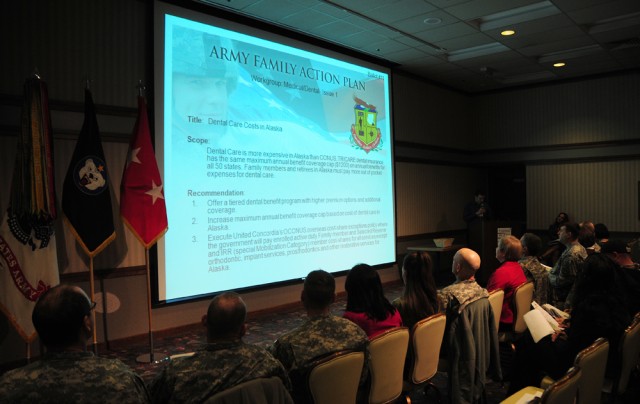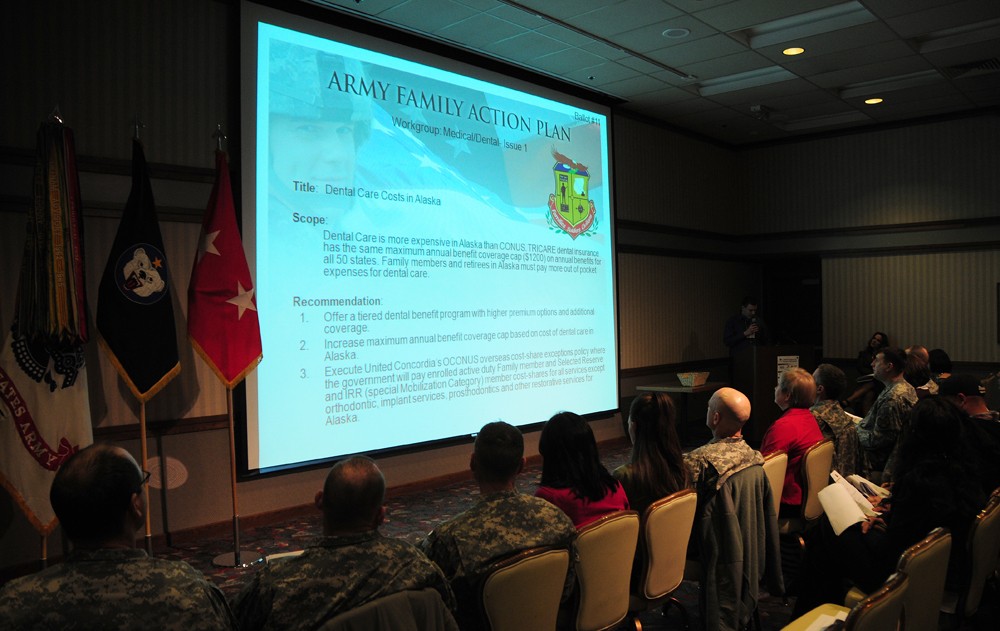
FORT WAINWRIGHT, Alaska - The old adage about change being inevitable is a proverb military families are very familiar with and typically embrace. Change in the life of Soldiers and their families often comes in the form of permanent change of station moves or deployments, but there is also a unique opportunity for Soldiers and families to affect a different kind of change in their lives and their communities through involvement in the Army Family Action Plan.
The Army describes AFAP as a "grassroots process to identify and elevate the most significant quality of life issues impacting Soldiers (all components), retirees, Department of the Army civilians and families to senior leaders for action."
Local AFAP programs process issues submitted by Soldiers, family members, retirees and civilian employees year-round and then work through them at an annual conference. The top issues are then submitted up through regions and eventually end up at the Headquarters Department of the Army AFAP conference.
As Fort Wainwright gears up for the installation's conference next month, three local volunteers attended the recent HQDA AFAP Conference in Washington, D.C., Jan. 31 through Feb. 4 and said they appreciated the opportunity to see the process at such a high level.
"I truly enjoyed the conference," said Spc. Elizabeth Riehm, Fort Wainwright's Better Opportunities for Single Soldiers president. "It was great to see that everyone involved in the Army has a voice and that no matter what the issue was it was addressed."
Riehm served as a delegate in a work group that tackled medical and dental issues. "When I signed up I never even thought I would have had the chance to put my two cents in to make things better, but there I was not only putting my two cents in but actually making a vote as a delegate to push forward issues concerning all military (service members)," she said.
Cyndi Raugh, senior family readiness group advisor and wife of Lt. Col. David Raugh, commander of 5th Squadron, 1st Cavalry Regiment, 1st Stryker Brigade Combat Team, 25th Infantry Division, also attended the Army conference and said it was a wonderful experience.
"The best part of it all was to see that (senior leaders) care and are very interested," she said.
She facilitated the Family Support Two working group and said her entire group and those who worked with her group during the conference were thrilled that their work group issue involving identification cards for children of fallen Soldiers was rated the number one AFAP issue for the entire conference.
"It's a great feeling to see when it all comes together and changes do happen," she said. "I think that's the pinnacle of the whole process - to be able to say, 'I was able to see that happen.'"
Raugh who has been involved with AFAP at six installations, one midlevel or regional conference and now one DA conference, said it has always been important to her to be involved in her Army community and AFAP is one of the ways she can do that.
"Ever since I married into the Army I promised myself and my husband that whatever I could do to help others or learn more about the Army lifestyle I would definitely put my effort into that. I think AFAP is a great opportunity to let leadership know what's going on at the grass-roots level; what the guys in the trenches are thinking about - their families, their concerns. It's a wonderful way to learn more about your community, the Army and leadership."
Raugh looked for Fort Wainwright's issues from last year's conference and was pleased to see that local issues had made it up to "big Army" for consideration.
Although the issue of providing financial assistance to help offset the initial costs of moving to Alaska and preparing for the extreme weather conditions was "tweaked" at the regional conference to be a more general cost of living allowance for overseas duty stations and then was ultimately not supported, she was still gratified to see it being considered.
"I was excited to see our number one issue from last year's installation AFAP being picked up and discussed," she said.
AFAP conferences have produced hundreds of significant quality of life contributions in the almost three decades since the program began. These include issues like increasing the Servicemembers' Group Life Insurance payout; increasing Basic Allowance for Housing; the authorization of the Thrift Savings Plan for military personnel; increasing family separation allowance; creation of programs like Army Family Team and BOSS; and much more.
AFAP issues that have brought change locally include the creation of an on-post shuttle, as well as bike paths and running routes on Fort Wainwright.
"AFAP is one of the resources people in our community have to affect change," said Charles Lyons, Army Family Team Building and AFAP program manager. Although there are other ways community members can submit concerns and issues like the ICE program and the Installation Action Council, AFAP is uniquely designed to also address issues that need higher-level consideration, he said.
"A lot of the issues that do come up in the IAC are generally customer-service based. However, when we talk about AFAP issues, we're talking about progress and major change; policy change, regulation, community resource enhancement, programs and services enhancement. We're talking about these types of major changes," Lyons explained.
Fort Wainwright's 2011 AFAP conference will be March 30-31. Lyons said he already has 37 delegates and will form three work groups - benefits and entitlements; military community and resource and the youth and teen work group.
Bringing youth and teens into the main conference with their own work group and teen facilitator is a significant part of the conference, he said. "It makes them feel part of the community," he said. "They're smart. They're bright. They are our future. Why not give them the opportunity to facilitate and manage their own (group)."
Lyons believes in change and the power of AFAP to bring about that change. He said the Fort Wainwright community will be the biggest asset to help this year's AFAP be a success. "The community has such great volunteers. They want change. They want to let the AFAP process be the way it's supposed to be. They want to see it work," he said.
Getting involved in the community through programs like AFAP is the best way to make a difference, Raugh said. "There's a whole generation of people after me and I hope they will get excited about being a part of this and having their voices heard," she said. "People come in with a fresh perspective. When someone is new they bring fresh ideas, a new perspective and a better way sometimes of doing things. So I would challenge them to see how we could streamline and be more efficient as a delegate or even by just submitting an issue."
AFAP issue forms and drop-off boxes are at the Physical Fitness Center, North Star Dining Facility, Bassett Army Community Hospital, Commissary, PX and Bldg. 3028. Community members can also email issues to fwa.afap@gmail.com. To volunteer or for more information about AFAP, call Lyons at 353-2382.

Social Sharing